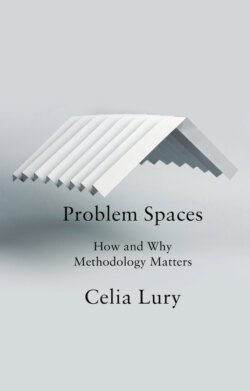Читать книгу Problem Spaces - Celia Lury - Страница 22
Approach 5: Appadurai
ОглавлениеThe fifth approach introduced here is that of the anthropologist Arjun Appadurai, who, in an early influential approach to the globalization of knowledge, described the complex scaling dynamics of the disjunctures and differences of global flows, including flows of ideas, people, technology, media and money (Appadurai 1990). In a later work (2013), he provides a set of terms that allows for the exploration of the specificity of different kinds of flows:11 this specificity arises, he says, from the inter-relationship of the circulation of forms with forms of circulation. The exemplars of forms he provides include novels and comics, but might also include problems, since they too are a ‘family of phenomena, including styles, techniques and genres, which can be inhabited by ‘specific voices, contents, messages and materials’ (2013: 66). He says:
The flow of these forms has affected major world-historical processes such as nationalism. Today, however, the flow of forms also affects the very nature of knowledge, as whole disciplines, techniques and ways of thinking move and transform in the process. (2013: 64)
His term ‘forms of circulation’ refers to kinds of movement or mobility, and thus draws attention to the properties of specific kinds of circulation, including scale, speed, and reach, and the organization of disjunctures of difference or internal differentiation. The methodological value of Appadurai’s focus on the inter-relationship of the circulation of forms and forms of circulation has been revealed in many studies of the social life or biography of things (for a discussion of this as a method see Kopytoff 1986; Lash and Lury 2007; Law, Ruppert and Savage 2011; Coleman 2019). Consider, for example, Susan Erikson’s study of new forms of philanthropic venture capitalism in global health (2015). By following the money, she shows how, in the form of its circulation, philanthropic money reveals different registers of value in global health. She says:
Asking “Who knows what?” and “What benefits whom?” opens up all manner of difference and differential stakes in well-being – financial and corporeal – and provides analytical traction on both new systems of advantage and recent intensifications of old systemic global inequalities. (2015: S307)
For a compositional methodology, a concern with the inter-relationship of forms of circulation and the circulation of forms provides a way to think about the capacity of what emerges in the use of methods to change or transform the problem in a process of generative circulation or generalization. It also provides a way to think about alterations in the epistemic infrastructure. Appadurai himself suggests that the twenty-first century is witnessing new tensions between circulating cultural forms and the emergent, partially culturally formed circuits associated with ‘the explosive growth in highly advanced tools for storing, sharing, and tracking information electronically both by the state and its opponents’ (2013: 62). He says: ‘This dual structure of global cultural forms also generates what we may call the ‘bumps’ or obstacles in regard to many cultural flows’ (2013: 64). Some of these bumps and obstacles will be discussed in later chapters.
